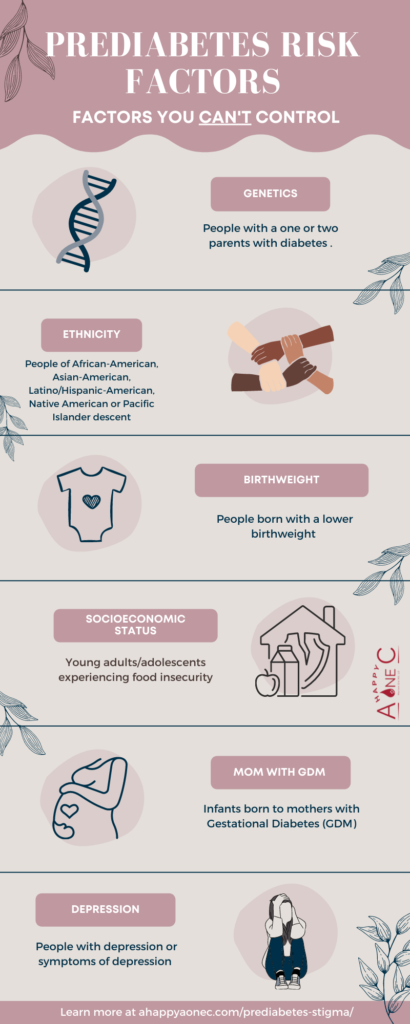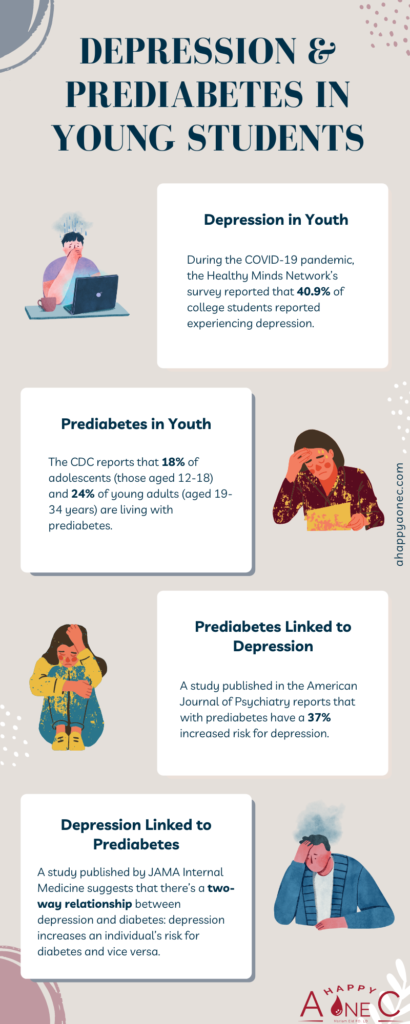Worry, failure, frustration, anxiousness, fear, self-blame, shame, disgust, guilt, embarrassment are just some of the feelings teens and young adults report after receiving a prediabetes diagnosis. You may be under the impression that you can no longer enjoy your childhood food favorites. All the joy you ever found in food has perished and you’re stuck with bland, tastelesss food. You can no longer experience college to the fullest degree. Nothing will ever be the same.
I’m here to tell you that your life is far from over. This is merely your beginning. The trajectory of your life has not been ruined. You may look back in 20 years and remember that this was best thing that ever happened to you.
Hiding Behind Prediabetes
I know how tempting it can be to hide your prediabetes diagnosis. It may seem like the harmless solution to maintaining everything as it is. You may feel inclined to put it aside until your post-college years. The reality is that hiding prediabetes may be more damaging than you think. It prevents you from seeking out the nutrition knowledge you need to prevent more serious conditions associated with prediabetes. By hiding it, you’re indirectly communicating to yourself that it’s something to feel shame and guilt about. You begin to identify with the shame, self-blame, and guilt, internalize the stigma, and hold contempt and disrespect towards your body.

I understand why you you’re afraid to face the stigma associated with prediabetes. People with prediabetes are inaccurately assumed to eat too much, exercise too little, and care little about their health. These unfair labels fail to acknowledge your family history of prediabetes, financial situation, responsibilities, and food security.
Let go.
I invite you to simply imagine with me. Imagine releasing yourself from the chains of the shame and stigma. Imagine letting go of what people think and putting yourself first. My mission with this article is to discuss the damage prediabetes stigma inflicts on young adults, outline the complexity of prediabetes, and empower you with the confidence to explore facing prediabetes head-on.

You did not cause prediabetes
Despite what anyone says, poor food and behavior choices are simply not enough to cause prediabetes. Prediabetes is complicated. There are many diabetes risk factors that are completely out of our control, i.e., non-modifiable. Since prediabetes is the condition that precedes diabetes, these risk factors apply to prediabetes.
Non-modifiable risk factors
- Genetics:
- There is strong scientific evidence suggesting that if one or both parents have diabetes, their childhood have a greater chance of developing prediabetes and later developing diabetes. A study found that having a family history of diabetes increases the offspring’s risk of prediabetes by 26%.
- Race or Ethnicity:
- People of African-American, Asian-American, Latino/Hispanic-American, Native American or Pacific Islander descent have a greater likelihood of developing diabetes.
- Birthweight:
- Studies have shown that people born with a lower birthweight showed an increased risk for developing diabetes (PMID: 29285058)
- Socioeconomic Status
- Adolescents/youth with prediabetes are more likely to experience food insecurity (PMID: 33888197)
- Born to a mom with gestational diabetes
- Infants born to mothers with Gestational Diabetes are more likely to develop diabetes later in life. (PMID: 26045324)
- Depression (more on this below)
- A meta-analysis found depression to be a strong risk factor for the development of type 2 diabetes. (PMID: 23419223)

The stigmatizing beliefs are false and damaging.
Many people shamelessly enjoy shaming & blaming others for their food or exercise habits as causing their prediabetes. However, they fail to take into account the non-modifiable risk factors listed above. Diet is simply ONE modifiable risk factors among many others, including sleep, weight, smoking, blood pressure, cholesterol levels, and physical activity.
Many people fail to recognize that prediabetes exists in people living in small and larger bodies. The stereotype that people with prediabetes are lazy overeaters is rooted in an archaic, non-scientific, privileged way of thinking. It fails to consider people’s access to safe, clean, nutritious foods. People growing up with low food security lack an environment conducive for health-promoting behaviors. They often live in food deserts and low-income neighborhoods that are not engineered to offer well-maintained public transit, sidewalks, bike lanes, or walking trails to promote physical activity. They are forced to rely on processed foods because they’re safe, convenient, and cost efficient. It’s a survival mechanism for people who simply don’t have the access, knowledge, or resources to prepare whole, less processed foods.
“Genetics loads the gun but the environment pulls the trigger”. Consider the privileges you had in your gene pool and environment before judging others.

Researchers have even recently found that people who recovered from a mild case of COVID-19 are at an increased risk of developing type 2 diabetes. This really highlights the complexity of prediabetes and diabetes. It is NEVER as simple as one factor causing it surface but rather a mixture of factors — some of which we have not yet even uncovered. The most important factor to consider is one we cant control: genetics.
When we put our logic glasses on, we can clearly begin to notice that self-blame is not the answer. It’s unethical to shame people for making food choices within their accessible resources and financial means. If you find yourself holding stigmatizing thoughts towards people with prediabetes and diabetes, consider your internalized biases, stereotypes, and privileges. You can never judge a person’s health based on your assumptions of them. You only know what’s at the tip of the iceberg.
Depression & Prediabetes
Depression in College Students
- Prior to the pandemic, the CDC reported that 21% of 18-29 year olds experience symptoms of depression.
- During the COVID-19 pandemic, the Healthy Minds Network’s survey reported that 40.9% of college students reported experiencing depression.
- A 2021 comprehensive survey of college students reports that 41% display symptoms of depression.
Prediabetes in College students
- As of 2018, a recent study found that 30% of American adolescents and teens fall in line with the prediabetes criteria.
- The CDC reports that 18% of adolescents (those aged 12-18) and 24% of young adults (aged 19-34 years) are living with prediabetes.
Prediabetes Linked to Depression
- People with prediabetes have been shown to have higher rates of depression or anxiety (PMID 27663115)
- A study published in the American Journal of Psychiatry reports that people with prediabetes have a 37% increased risk for depression
Depression Linked to Prediabetes
- People with anxiety and depression have a two-fold increased risk for developing Type 2 Diabetes (PMID: 29852343)
- A Swedish study reported that self-perceived chronic stress was associated with 45% increased risk diabetes. (PMID: 23075206)
- A study published by JAMA Internal Medicine suggests that there’s a two-way relationship between depression and diabetes: depression increases an individual’s risk for diabetes and vice versa.

What do these data points have in common?
If you consider the current rate of depression among college students, the current rate of teens with prediabetes entering college, and the association between prediabetes and mental health conditions, the odds start to pile against your favor. The research has established that depression and stress independently increase a person’s risk for prediabetes.
Since these statistics are based on associations and correlations, we can’t assume that depression causes prediabetes and vice versa. However, the research does suggests that depression and prediabetes may be linked biologically and influence the development of each other.
It’s no surprise that people experiencing prediabetes stigma may later develop a decrease in self-worth and increased risk for depression. This leaves people with prediabetes experiencing depression with a multiplied risk of later developing diabetes. Imagine the amount of damage people inflicting stigma on others with prediabetes are causing. On top of that, college students face stigma surrounding both mental health conditions and prediabetes.
How Does Depression Affect Blood Sugar?
We know that depression and anxiety are recognized as a form of psychological stress. The body is only programmed to react to physical stress, like during caveman times of being chased by a bear, to prepare you for a fight or flight situation. It releases cortisol, which increases your blood sugar to deliver quick energy to your cells so you can run away. The body does not differentiate between psychological stress from mental health conditions and physical stress from bears. Therefore, regardless of whether you’re being chased or not, the psychological stress from depression and anxiety can increase your blood sugar levels via cortisol. This also stands true for people experiencing high stress levels from their school, work, and personal lives.
Therefore, if you are a college student experiencing depression and high stress levels, you are already at an increased risk for developing prediabetes and diabetes.
blaming the victim is not the answer
Unjustly blaming the victim and spreading stigma damages their health and self-worth of people with prediabetes. They may begin to internalize your false assumptions and produce damaging thoughts about food and their body. These complex emotions are often left unresolved and may be responded to by over restriction or emotional eating as a coping mechanism. Both of these disordered tendencies that can lead to the development of eating disorders. Eating disorders are the leading cause of death among all mental disorders. Therefore, stigma can literally feed disordered thoughts and behaviors that increase risk of death independent of prediabetes.
picture this:
You’re a first-year college student adjusting to living on your own. You go to your yearly physical and receive an official prediabetes diagnosis. You’re worried because you have a strong family history for diabetes and witnessed your grandmother on insulin therapy for diabetes. The fatigue, constant thirst, and hanger starts to make sense. You’re confused, overwhelmed, stressed, and have no idea what steps to take next. You ask Google what to eat for prediabetes and the results tell you to cut out every food that ever brought you joy. Your told to purchase food outside your budget and prepare complex-looking meals. You dont know how eating will every be the same again. You’re worried about the rest of your college years. You start blaming yourself for your diagnosis, pinpointing every “unhealthy” meal you could think of. You’re worried what your family, friends will say about you. You choose to hide the diagnosis to avoid scrutiny from everyone around about what you eat. You fall into a deep pit of self-blame, disgust, shame and start to identify with those characteristics. Slowly, everything you once enjoyed lost its appeal. You’re starting to skip class and step away from your family and friends. You find it more and more difficult to get out of bed everyday. You now skip the weekly soccer game with your high school friends that you used to look forward to eagerly.

You recall your failures and fall into a depressive episode. It feels as if you’re falling deeper and deeper into a pit and can’t find your way back up. You wake up the next day feeling a tad better. You decide to try to eat raw vegetables and chicken breast for dinner recommended by a blogger online but end up starving. You feel hopeless, hungry, and end up at McDonalds. You find yourself losing control with food and eating far past the feeling of physical fullness. You later feel disgusting and guilty for overindulging. Rinse. Repeat.
what could have been done differently?
I encourage you to explore, what could you have done differently to warrant a better outcome? When did the chaos start? How would you now support a college mate with prediabetes? Please leave your thoughts in the comments.
What Should I Do To Support Myself?
- Surround yourself with the support of loved ones
- Avoid accusatory shame-and-blame language
- Practice self care and know that you deserve to feel your best
- Seek out the support of a Registered Dietitian
- Choose a healthcare provider that you feel comfortable with
- Find activities that make you feel good
- Seek out a licensed counselor
- Explore the thought of prediabetes as a blessing in disguise
- Stay tuned for future posts to learn more on how to approach prediabetes in a gentle, sustainable manner.

